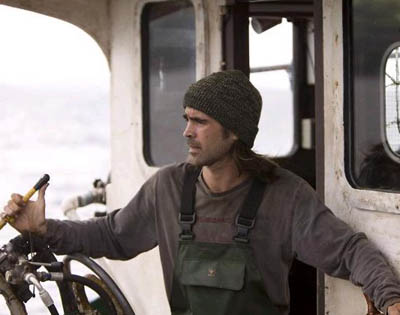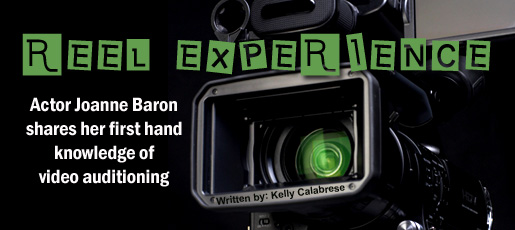Truths from the set of his latest movie
Between myth and reality, Colin Farrell has learned to live with the many reputations that precede him.
We all, as human beings, probably do a good job of misrepresenting ourselves a lot of the time, Colin says. The press has got its space to fill. I’ve read some nasty, nasty things through the years and I’ve read some really nice things written about me. Neither really holds the essence of truth.
That essence, that line between what’s real or imaginary, also plays an integral role in Colin Farrell’s latest movie, Ondine.
Written and directed by Neil Jordan, Ondine tells a tale about Syracuse, a simple fisherman (played by Colin Farrell), who catches a beautiful and mysterious woman in his trawler’s nets. The woman seems to be dead, but then she comes alive before Syracuse’s eyes and turns out to be a possible mythical creature in modern times.
To find out what happens, you’ll have to catch the movie and see for yourself.
Yet, NYCastings did reel in many on-set secrets for you during our interview with Colin Farrell and Neil Jordan.
The two blokes kept NYCastings laughing and sighing as they shared stories about the filming of Ondine as well as how Irish men pick up women when there aren’t any trawler nets around…
Q&A with Collin Farrell and Neil Jordon
 Q: How did you prepare for this film, which shot mainly on the water?
Q: How did you prepare for this film, which shot mainly on the water?
Colin Farrell: From day one, all I needed was in the script. I didn’t really have to go outside the script. I just thought a lot about it from the first time I read it to the time that I agreed to do it. You become consumed by imaging what it’ll be like to walk in this man’s shoes and to emerge yourself in this world. And I spent some time, two weeks before we started shooting, on the boat. Everyday we just trolled up and down the coastline of the Atlantic Ocean. It was just a magic, magic time.
Q: Colin, when you heard that this film was about the myth of the Selkie did you read up on it or were you already familiar with the story?
Colin Farrell: No. In the film, she’s very different. Syracuse is a man where one of his greatest strengths is his ignorance in many ways. He’s very much a hero but also just pursuant of the present. He’s someone that equates love to loss but there’s no kind of self-flagellating pity going on his life. He’s okay with it and then this woman comes in and by the mere nature of catching her in the net, it’s a little bit odd from the start. It’s not like he met her in a pub or over a nice portion of fish and chips at the local chip shop as so happens romantically in Ireland on Friday night. This woman brings something into his life that he doesn’t quite comprehend. She represents that thing that transcends the drudgery of everyday existence, the kind of wee insertion of love into his life.
Q: Neil, you write many fractured fairytales, what drew you to write this fantastical story?
Neil Jordan: Well, I asked questions. What if a group of real characters, lived in an incredibly beautiful landscape, but they lived poverty-stricken lives? If a series of coincidences happen in that world, would a believable fairy tale emerge from that? That’s the question I was asking when I was writing the script and that’s the way that I shot it really. I wanted to see the landscape tell the tale without any visual interference, any arch direction interference. That did it in the end.
Q: Colin, you’ve played some brutal and aggressive characters in the past. What was it like playing this gentle, loving guy?
Colin Farrell: It was so boring. I didn’t get to scalp anyone. (Laughs) It was really lovely. It was nice to be able to play a character that wasn’t burdened by the notion of responsibility or wasn’t consumed with the idea of pretense, even in an unaware way. There was a simplicity and a humility to the character that was really, really lovely. It was somebody that had both removed himself from the societal grid and had also been kind of ostracized from the community as well. No man is an island unto himself but he had kind of become that. I found this nice, lovely, melancholy tune without any self-pity. It was the first time, in twelve years, that I played a character I wasn’t looking forward to leaving. I’m going to miss Syracuse, even his name.
Q: Neil, what drew you to write a tale so rooted in magic and Ireland?
 Neil Jordan: What brought me to it is that I’ve made a lot of movies with violence. I thought, could I make a film that was terribly simple and terribly forgiving where nobody dies in the end and nobody transforms into some ghoulish, some monstrous thing?’ That’s all.
Neil Jordan: What brought me to it is that I’ve made a lot of movies with violence. I thought, could I make a film that was terribly simple and terribly forgiving where nobody dies in the end and nobody transforms into some ghoulish, some monstrous thing?’ That’s all.
Q: Can you talk about the casting of Ondine?
Neil Jordan: Yeah. It’s hard to put together independent movies at that moment. It’s like, ‘Okay, you’ve got Robert Duvall and you’ve got Johnny Depp. Can we also have Jennifer Aniston? Or else we can’t sell it in Hong Kong.’ So, I cast Colin and then they give the project to these international sales companies who do what they call running numbers.
Colin Farrell: Turns out I’m not too big in Hong Kong.
Neil Jordan: But for Ondine, I thought she should be unknown because I want to see someone that I’ve never seen before which very rarely happens unless you cast kids. I saw a lot of East European actresses and Alicija (Bachleda) came in one day. She gave this reading and I thought, ‘she’s really making this work. This will be interesting.’ I thought she was a really great actress. She had a very difficult part to play because she’s playing the interpretation that other people put onto a character. That’s a very difficult thing to do.
Q: How do you view the lines between myth and reality as an actor?
Colin Farrell: We all have a responsibility, an obligation, a really exciting opportunity to design our lives to a certain extent. Some of us are born into a particular demographic or situations in which it is very hard to design anything but the needs of survival. But I’ve been very fortunate in my life. I’ve had a chance to design, through the work, where I want to go, what questions I want to ask, and or what issues I want to take a look at; personal issues, human issues or existential issues in my own sort of way. So, with that in mind, the work is really interesting. I don’t do it for therapeutic reasons at all. I would be a basket case if I did, like if it was therapy. But it is interesting to approach the idea of walking in another man’s shoes.
Q: Is there a comfort to shooting in Ireland, Colin, or maybe is there a feeling of more pressure when you’re shooting there?
Collin Farrell: The only element of fear would be going home to people where I’m from not thinking that I’ve changed and that’s understandable and childish and you get over quick enough. I love Ireland very much. It makes sense to me. It uplifts me, it frustrates me, and my relationship to it is the same. It’s beautiful. One of the most beautiful parts of the world that I’ve ever been to is the Beara Peninsula and I did my first job there twelve years ago. I did a four-part mini-series for the BBC called Falling For a Dancer. It was great to go back to that part of the world and work with a director/writer that I’d wanted to work with for seven or eight years on a story that was so inherently beautiful. A story so predominantly about the need for hope and the need to believe that it transcends the real world as you perceive it. It was just a perfect storm for me. And I worked with some of the drivers and caterers that I’d known for twelve, thirteen, fourteen, fifteen years. Those are happy days.
Will Ondine have a happy or a tragic ending?
Check it out opening day, June 4th, to find out!Released by Magnolia Pictures.







